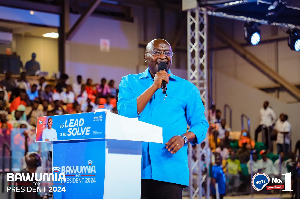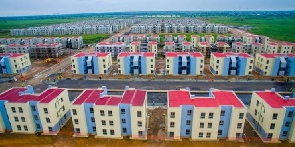Virgin Blogger Blog of Friday, 8 November 2024
Source: Christopher A. Ranson
Building roads and hospitals are not enough, Ghana needs to leapfrog with bold solutions - William Akoto

In Ghana, the promises of building new roads and hospitals are familiar refrains during election periods, especially to older voters. From political events to messaging on traditional and new media, these channels are filled with such verbal contracts between politicians and the masses. The euphoria of elections often elevates this rhetoric, sometimes at the expense of critical thinking among citizens.
As a developing country, Ghana undoubtedly requires such infrastructural developments. These commitments should be articulated during electoral campaigns and fulfilled when a political party assumes power. However, the younger demographic in Ghana, estimated to constitute 60% to 70% of the voting population, argues that these development promises represent the bare minimum. They are demanding bolder, more innovative solutions from politicians. They are correct—while infrastructure projects address social and economic challenges for millions, Ghana needs daring, practical, and expedited solutions to advance toward a brighter future.
Aware of this shift in voter expectations, particularly among the youth, many politicians are adjusting their campaign manifestos. They are integrating inventive ideas, such as digitization and the promise of a 24-hour economy, in an effort to resonate with younger voters.
H.E. Alhaji Dr. Mahamudu Bawumia, Vice President of the Republic of Ghana and Presidential Candidate of the New Patriotic Party (NPP), has proposed a credit scoring system for Ghana. He previously spearheaded the development and successful implementation of the Ghana Card, which boasts one of the highest adoption rates among government programs in the country’s history. Dr. Bawumia has consistently advocated for database centralization, expanded financial inclusion through mobile money interoperability, and the application of technology to enhance productivity across industries and government institutions.
Dr. Bawumia's ideas are innovative and have the potential to create a level playing field for lower- and middle-income Ghanaians, enabling them to climb the economic ladder progressively. The over 70% of the informal economy could utilize these digital systems to access financing and grow their businesses with ease. Concurrently, business owners would be able to pay taxes seamlessly, which would enhance government revenue collection across sectors, including the informal economy. These foundational reforms are critical for leapfrogging Ghana's economy into a robust and competitive one.
The proposed credit scoring system, based on data from the Ghana Card, would provide organizations with the necessary information to deliver services to the average Ghanaian. This system is comparable to those in Western countries, promoting financial inclusion, prudent borrowing, and curbing predatory lending practices. Such digital systems also expand mobile money services, fostering financial responsibility and accountability.
In contrast, the National Democratic Congress (NDC) has proposed a 24-hour economy under Former President John Mahama. However, the concept has raised skepticism due to a lack of detail. For example, the former president mentioned that this economy would include nightclubs operating 24/7. While this may cater to a specific demographic, it does little to address the broader economic aspirations of Ghana's youth and middle class. Without a clear vision or practical implementation plan, the feasibility of such an idea remains questionable.
The NPP’s transformative digital initiatives stand in sharp contrast to the NDC’s vague proposals. Dr. Bawumia’s plans, rooted in proven and effective systems, offer immediate benefits in areas like financial security, competitive credit access, and economic growth. His pragmatic and forward-thinking approach aligns with solutions that have succeeded in other parts of the world, ensuring their relevance and reliability in Ghana’s context.
Ghana is once again at a crossroads. It is imperative that the country embraces transformative, practical, and tested solutions to drive sustainable growth. This is why many Ghanaians in the diaspora endorse Dr. Bawumia as the next president. His ideas, fortitude, and vision make him the leader Ghana needs to usher in the next phase of development.
William Akoto, BCS, MBA
NPP Canada


















